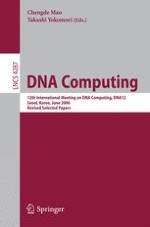2006 | OriginalPaper | Chapter
“Reasoning” and “Talking” DNA: Can DNA Understand English?
Authors : Kiran C. Bobba, Andrew J. Neel, Vinhthuy Phan, Max H. Garzon
Published in: DNA Computing
Publisher: Springer Berlin Heidelberg
Activate our intelligent search to find suitable subject content or patents.
Select sections of text to find matching patents with Artificial Intelligence. powered by
Select sections of text to find additional relevant content using AI-assisted search. powered by
Memory is a fundamental challenge in computing, particularly if they are to store large amounts of interrelated data based on content and be queried associatively to retrieve information useful to the owners of the storage, such as self-assembled DNA structures, cells, and biological organisms. New methods to encode large data sets compactly on DNA chips have been recently proposed in (Garzon & Deaton, 2004) [6]. The method consists of shredding the data into short oligonucleotides and pouring it over a DNA chip with spots populated by copies of a basis set of noncrosshybridizing strands. In this paper, we probe into the capacity of these memories in terms of their ability to discern semantic relationships and discriminate information in complex contexts in two applications, as opposed to their raw capacity to store volumes of uncorrelated data. First, we show that DNA memories can be designed to store information about English texts so that they can “conduct a conversation” about their
content
with an interlocutor who wants to learn about the subject contained in the memories. In this preliminary approach, the results are competitive, if not better, with state-of-the-art methods in conventional artificial intelligence. In a second application in biology, we show how a biomolecular computing analysis based on similar techniques can be used to re-design DNA microarrays in order to increase their sensitivity to the level required for successful discrimination of conditions that may escape detection by standard methods. Finally, we briefly discuss the scalability of the common technique to large amounts of data given recent advances in the design of noncrosshybridizing DNA oligo sets, as well other applications in bioinformatics and medical diagnosis.
